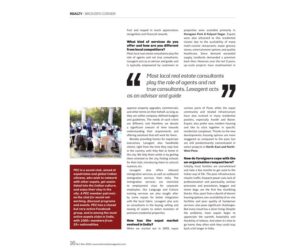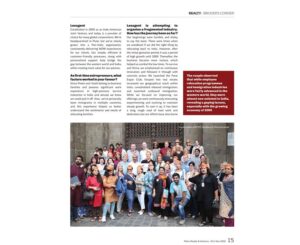MEDIA COVERAGES
- November 01, 2016
- Metro Realty & Interiors
LEXAGENT: CORPORATE RENTALS WITH EXPAT RELOCATIONS
Vikas Roongta and his wife Preeti Roongta had lived and worked at a case management software company in Silicon Valley for 6 years before a work assignment made them look at things from a different perspective. In what was to be the power couple’s last assignment in California, Vikas and Preeti were tasked with software implementation for numerous relocation companies, global firms, and mobility teams of multinational corporations. This led to a life-changing realization. The couple observed that while employee relocation programs and immigration industries were fairly advanced in the Western world, they were almost non-existent in India, revealing a gaping lacuna, especially with the growing economy of 2005. So packing their bags, Vikas and Preeti flew back to India to start Lexagent – an employee relocation, real estate, and immigration services company. From its humble beginnings in 2005, Lexagent has become the go-to provider for multinational corporations today. We caught up with Vikas Roongta to hear more about his company and the expat culture in the city.
Lexagent
Established in 2005 as an Indo-American Joint Venture, today is a provider of choice for many global corporations. We’re headquartered in Pune, but we’ve slowly grown into a Pan-India organization, consistently delivering WOW experiences for our clients. Our simple, efficient & customer-friendly process, along with personalized support, helps bridge the gap between the Western world and India while creating more value for our patrons.
As first-time entrepreneurs, what factors worked in your favor?
Since Preeti and I both belong to business families and possess significant work experience in high-pressure service industries in India and abroad, we knew we could pull it off. Also, we’ve personally been immigrants in multiple countries, and this experience helped us better understand the sentiments and needs of relocating families.
Lexagent is attempting to organize a fragmented industry. How has the journey been so far?
Our beginnings were humble, and shaky, to say the least. There were times when we wondered if we did the right thing by relocating back to India. However, after the initial gestation period, it was a period of high growth until 2009. Thereafter, the business became more mature, which helped us combat the low times. To survive and thrive, we emphasized continuous innovation and followed it through with concrete action. We launched the Pune Expat Club, forayed into real estate, increased our geographical reach within India, consolidated inbound immigration, and launched outbound immigration. While we focused on improving our offerings, we were continuously innovating, experimenting, and evolving to maintain steady growth. To sum it up, it has been a long rough road of hard work and dedication, but our efforts have also borne fruit and reaped much appreciation, recognition, and financial rewards.
What kind of services do you offer and how are you different from local competitors?
Most local real estate consultants play the role of agents and not true consultants. Lexagent acts as an advisor and guide; and is typically empowered by customers to approve property upgrades, commercials, and other terms on their behalf, as long as they are within company-defined budgets and guidelines. The needs of each client are different; and therefore, we devote a significant amount of time towards understanding their requirements and offering solutions that will work for them.
Besides providing homes for expatriate executives, Lexagent also handholds clients, right from the time they step foot in the country until they feel at home in the city. We help them settle in by getting them oriented to the city, finding schools for their kids, introducing them to cultural nuances, etc.
Lexagent also offers inbound immigration services, as well as outbound immigration services from India. The Immigration services are restricted to employment visas for corporate employees. Our Language and Culture training services are also sought after by some expats for better integration with the local fabric. Lexagent also acts as a consultant in the buying, selling, and leasing of assets to select investors of premium residential properties.
How has the expat market evolved in India?
When we started in 2005, expat properties were available primarily in Koregaon Park & Kalyani Nagar. Expats were also attracted to this residential cluster due to the availability of many multi-cuisine restaurants, expat grocery stores, entertainment options, and quality healthcare. Since demand exceeded supply, landlords demanded a premium back then. However, over the last 5 years, up-scale projects have mushroomed in various parts of Pune, while the expat community and related infrastructure have also evolved in many residential pockets, especially Aundh and Baner. Expats also prefer new, modern housing and like to stick together in specific residential complexes. Thanks to the new developments, housing options are more staggered as compared to the past; but are still predominantly concentrated in select projects in North-East and North-West Pune.
How do foreigners cope with the organization rampant here?
Initially, most families are overwhelmed, and takes a few months to get used to the Indian way of life. The poor infrastructure, chaotic traffic, frequent power cuts, lack of professionalism and punctuality, unclear processes and procedures, beggars, and street dogs, are the first few stumbling blocks. Also, apart from a dearth of decent housing options, the non-availability of on-site facilities and poor quality of handyman services, pose significant challenges. But every cloud has a silver lining. Despite the problems, most expats begin to appreciate the warmth, hospitality, and flexibility of Indians. And when it’s time to go home, they often wish they could stay back a bit longer in India.
Tell us a bit more about your customer profile.
Our customers are primarily multinational corporations that frequently relocate employees into and from India. We support over 100 corporations in 9 cities across India. In addition, we also represent select investors in leasing/selling/buying residential properties.
Where do the expats come from primarily?
We see a lot of international traffic from Europe and America. The average stay duration is 2-3 years. There are a few families who have been here for more than 10 years, and if the Government allows, they would be more than happy to retire in India.
Do you focus only on the luxury segment since you deal with expats? How is a foreign customer different from an Indian client?
Yes, we predominantly deal in the luxury segment. The expat client is a stickler for quality. They expect proper documentation, quick responses, and extended tenancy support. They easily get disturbed by even petty tenancy issues and require a lot of hand-holding. Unlike Indian clients, international families continuously sleek support and information throughout their stay. Observing this behavior, Lexagent launched the Pune Expat Club (PEC) in 2010.
Unlike Lexagent, not many players work with corporate giants. What advice would you share with those looking to venture into this field?
Dealing with multinational corporations is a different ball game altogether. It requires one to invest in systems, processes, team members, and training. When you’re dealing with MNCs, you must align your operations to the different policies including Anti-Corruption & Anti-Bribery, Privacy & Disclosures, Data Information Security & Data Protection, Health & Safety, and Environmental & Sustainability policies. To be successful, your business should instill a sense of reassurance and make them feel like they are in safe hands.
What trends have you observed about relocation and immigration services in Pune?
Our relocation and inbound immigration services were in high demand from 2006 to 2009. Thereafter, the demand dipped in 2010 and was low for a few years. We are now experiencing a gradual revival, with the demand slowly rising over the last two years. Our recent initiative of outbound immigration, delivered by Lexagent with the support of global partners in different countries, is also picking up speed.
Tell us about your expansion plans. What does the future hold?
We believe in slow and steady growth. We’re operating in a zero-tolerance industry and we firmly believe in the wisdom of strengthening our existing customer base, rather than hankering after new ones. In the immediate future, we aim to increase our market share through better penetration in Pune and increased presence in other parts of India. We are also focusing on developing and grooming the second line of managers, who can take independent charge as we grow. The big challenge we face in this industry lies in the transition of the business into an enterprise that survives and sustains beyond the life of promoters. We’re currently exploring various ways to overcome this challenge.
Lexagent is an effective organization that is well-focused and determined to organize the real estate consultation industry. With systematic and robust procedures in place that make relocation less hectic and problematic, this company is set to rule in the years to come.
HOW DOES PUNE CATER TO THE GROWING BUSINESS NEEDS? WHAT CHANGES WOULD YOU LIKE TO SEE?
With its abundant talent, established IT parks, easy access to Mumbai, and availability of land to set up large manufacturing facilities, Pune will remain one of the favorite destinations for multinational corporations. I would welcome an international airport and better public transport infrastructure, which ideally should’ve been in place by now.
When it comes to Lexagent, we do have some ideas and logical extensions to add to our service basket and will announce them as and with the continued support of those who have stood by us through the thick and thin-our team, the builder community, and our fellow realtors – I believe the sky’s the limit!
PEC is a social club, aimed at expatriates and global Indian citizens, who wish to network with other expats, get assimilated into the Indian culture, and enjoy their stay in the city. A PEC member patronizes the club for social networking, discount programs, and events. PEC has a closed but very active Facebook group, and is among the most active expat clubs in India, with 1000+ members from 25+ nationalities.




